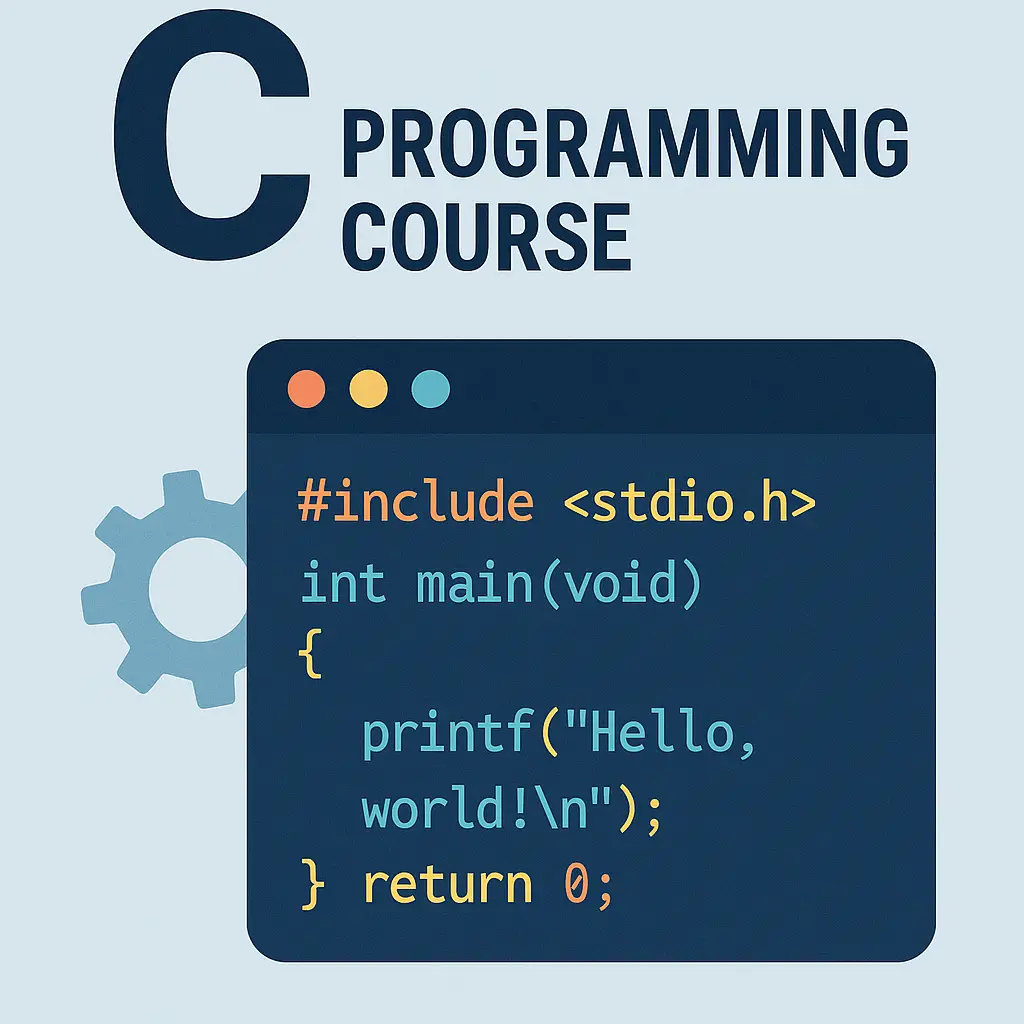Introduction
Welcome to the comprehensive C++ programming course! This course is designed to guide you from the basics of programming to advanced concepts in C++. Whether you’re a beginner or looking to enhance your programming skills, this course covers all the essential topics you need to master C++.

Course Outline
Introduction to C++
- History and Features of C++
- Setting Up the Development Environment
- Your First C++ Program
Fundamentals of C++
- Variables and Data Types
- Operators and Expressions
- Control Flow Statements
- Loops and Iteration
Functions
- Defining and Calling Functions
- Function Parameters and Return Values
- Scope and Lifetime of Variables
- Recursive Functions
Arrays and Pointers
- One-Dimensional and Multi-Dimensional Arrays
- Introduction to Pointers
- Pointer Arithmetic
- Dynamic Memory Allocation
Strings and File I/O
- C-Style Strings vs.
std::string - String Manipulation Functions
- File Input/Output Operations
- Reading and Writing Files
- C-Style Strings vs.
Object-Oriented Programming
- Classes and Objects
- Constructors and Destructors
- Inheritance and Polymorphism
- Encapsulation and Abstraction
Advanced OOP Concepts
- Operator Overloading
- Templates and Generic Programming
- Exception Handling
- Namespaces and Scope Resolution
The Standard Template Library (STL)
- Introduction to STL
- Containers (Vector, List, Map, Set)
- Iterators
- Algorithms and Functors
Modern C++ Programming Features
- Lambda Expressions
- Smart Pointers
- Move Semantics
- Multithreading
Project Development
- Planning and Designing a C++ Project
- Implementation and Testing
- Debugging and Optimization
- Documentation and Maintenance
Module Details
1. Introduction to C++ Programming
History and Features of C++
- Overview: Learn about the origins of C++, its evolution, and why it’s widely used.
- Key Concepts:
- Developed by Bjarne Stroustrup in the 1980s.
- Extension of the C language with object-oriented features.
- Standardized by ISO; latest standard is C++20.
- Why Learn C++:
- High performance and efficiency.
- Widely used in game development, system/software development, and real-time applications.
Setting Up the Development Environment
- Choosing a Compiler and IDE:
- Popular compilers: GCC, Clang, Microsoft Visual C++.
- IDEs: Visual Studio Code, CLion, Code::Blocks, Eclipse.
- Installation Guides:
- Windows: Install MinGW or Visual Studio.
- macOS: Install Xcode or use Homebrew to get GCC/Clang.
- Linux: Use package manager to install GCC/G++.
Your First C++ Program
- Writing “Hello, World!”:
#include <iostream>
int main() {
std::cout << "Hello, World!" << std::endl;
return 0;
}- Explanation:
#include <iostream>includes the Input/Output stream library.int main()is the entry point of the program.std::coutoutputs data to the console.std::endlinserts a newline character and flushes the output buffer.- Compiling and Running:
- Command Line:
- Compile:
g++ -o hello hello.cpp - Run:
./hello(Linux/macOS) orhello.exe(Windows)
- Compile:
- Using an IDE:
- Create a new project, write code, and click the run/build button.
2. Fundamentals of C++ Programming
Variables and Data Types
- Basic Data Types:
int– Integer numbers.float– Floating-point numbers.double– Double-precision floating-point numbers.char– Single characters.bool– Boolean values (trueorfalse).- Variable Declaration and Initialization:
int age = 25;
float height = 175.5f;
char grade = 'A';
bool isStudent = true;- Input and Output:
- Input:
std::cin >> variable; - Output:
std::cout << variable;
Operators and Expressions
- Arithmetic Operators:
+,-,*,/,% - Relational Operators:
==,!=,>,<,>=,<= - Logical Operators:
&&,||,! - Assignment Operators:
=,+=,-=,*=,/=,%= - Example:
int x = 10;
x += 5; // x is now 15Control Flow Statements
- Conditional Statements:
- If Statement:
cpp if (condition) { // code to execute if condition is true } else { // code to execute if condition is false } - Switch Statement:
cpp switch (variable) { case value1: // code break; case value2: // code break; default: // code }
Loops and Iteration
- For Loop:
for (int i = 0; i < 10; i++) {
// code to execute
}- While Loop:
while (condition) {
// code to execute
}- Do-While Loop:
do {
// code to execute
} while (condition);3. Functions
Defining and Calling Functions
- Syntax:
return_type function_name(parameter_list) {
// function body
}- Example:
int add(int a, int b) {
return a + b;
}
int main() {
int sum = add(5, 3);
std::cout << "Sum is " << sum << std::endl;
return 0;
}Function Parameters and Return Values
- Pass by Value: Copies the value.
- Pass by Reference: Passes a reference to the actual variable.
void increment(int &value) {
value++;
}Recursive Functions
- Example: Factorial Function
int factorial(int n) {
if (n <= 1) return 1;
else return n * factorial(n - 1);
}4. Arrays and Pointers
Arrays
- Declaration:
int numbers[5] = {1, 2, 3, 4, 5};- Accessing Elements:
int firstNumber = numbers[0];Pointers
- Declaration and Initialization:
int x = 10;
int *ptr = &x; // ptr holds the address of x- Dereferencing:
int value = *ptr; // value is now 10- Pointer Arithmetic:
- Incrementing a pointer moves it to the next memory location of its type.
Dynamic Memory Allocation
- Using
newanddelete:
int *array = new int[10]; // allocate array of 10 ints
delete[] array; // deallocate array5. Strings and File I/O
Strings
- C-Style Strings:
char str[] = "Hello";std::stringClass:
std::string greeting = "Hello, World!";File Input/Output
- Including fstream Library:
#include <fstream>- Writing to a File:
std::ofstream outFile("example.txt");
outFile << "Writing to a file.n";
outFile.close();- Reading from a File:
std::ifstream inFile("example.txt");
std::string line;
while (std::getline(inFile, line)) {
std::cout << line << std::endl;
}
inFile.close();6. Object-Oriented Programming
Classes and Objects
- Defining a Class:
class Rectangle {
public:
int width, height;
int area() {
return width * height;
}
};- Creating Objects:
Rectangle rect;
rect.width = 5;
rect.height = 10;
int area = rect.area();Constructors and Destructors
- Constructor:
class Rectangle {
public:
Rectangle(int w, int h) : width(w), height(h) {}
// ...
};- Destructor:
~Rectangle() {
// cleanup code
}Inheritance and Polymorphism
- Inheritance:
class Animal {
public:
void eat() { std::cout << "Eatingn"; }
};
class Dog : public Animal {
public:
void bark() { std::cout << "Barkingn"; }
};- Polymorphism with Virtual Functions:
class Base {
public:
virtual void show() { std::cout << "Basen"; }
};
class Derived : public Base {
public:
void show() override { std::cout << "Derivedn"; }
};7. Advanced OOP Concepts
Operator Overloading
- Overloading Operators:
class Complex {
public:
int real, imag;
Complex operator + (const Complex &obj) {
Complex res;
res.real = real + obj.real;
res.imag = imag + obj.imag;
return res;
}
};Templates and Generic Programming
- Function Templates:
template <typename T>
T add(T a, T b) {
return a + b;
}- Class Templates:
template <class T>
class Array {
T *ptr;
int size;
// ...
};Exception Handling
- Try, Catch, Throw:
try {
// code that may throw an exception
throw std::runtime_error("An error occurred.");
} catch (const std::exception &e) {
std::cout << e.what() << std::endl;
}8. The Standard Template Library (STL)
Containers
- Vectors:
std::vector<int> numbers = {1, 2, 3, 4, 5};
numbers.push_back(6);- Maps:
std::map<std::string, int> ages;
ages["Alice"] = 30;Iterators
- Using Iterators:
std::vector<int>::iterator it;
for (it = numbers.begin(); it != numbers.end(); ++it) {
std::cout << *it << std::endl;
}Algorithms
- Sorting and Searching:
std::sort(numbers.begin(), numbers.end());
auto it = std::find(numbers.begin(), numbers.end(), 3);9. Modern C++ Programming Features
Lambda Expressions
- Syntax:
auto sum = [](int a, int b) { return a + b; };
int result = sum(5, 3);Smart Pointers
- Unique Pointer:
std::unique_ptr<int> ptr(new int(10));- Shared Pointer:
std::shared_ptr<int> ptr1 = std::make_shared<int>(20);Multithreading
- Including Thread Library:
#include <thread>- Creating Threads:
void threadFunction() {
// code to execute in new thread
}
int main() {
std::thread t(threadFunction);
t.join(); // wait for thread to finish
return 0;
}10. Project Development
Planning and Designing
- Defining Objectives:
- Clear understanding of what the program should accomplish.
- UML Diagrams and Flowcharts:
- Visual representations of classes and program flow.
Implementation and Testing
- Version Control with Git:
- Track changes and collaborate.
- Unit Testing:
- Write tests for individual components.
Debugging and Optimization
- Debugging Tools:
- Use of debuggers like GDB.
- Performance Profiling:
- Identify bottlenecks and optimize code.
Documentation and Maintenance
- Code Comments and Documentation:
- Use comments and tools like Doxygen.
- Refactoring:
- Improve code structure without changing functionality.
Conclusion
By the end of this course, you will have a solid understanding of C++ programming and be able to develop complex applications. Remember to practice regularly and work on projects to apply what you’ve learned.
Additional Resources
- Books:
- C++ Primer by Stanley B. Lippman
- Effective Modern C++ by Scott Meyers
- Online Tutorials:
- cplusplus.com
- cppreference.com
- Communities:
- Stack Overflow
- Reddit C++ Community
Happy coding!


